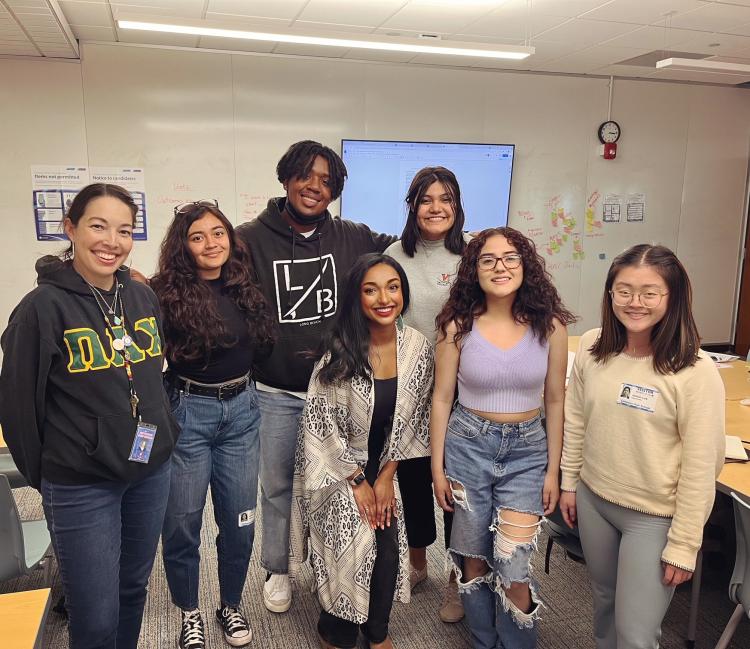From fertile soil: co-creating a youth-led ethnic studies curriculum
 “you are not your roots. you are a flower grown from them.” – pavana reddy
“you are not your roots. you are a flower grown from them.” – pavana reddy

For most of my education as a first-generation immigrant, I grew familiar with not seeing myself represented and internalized that I was not worthy of being cared for. I remember my dialect losing its rhythm. Wearing clothes that didn’t reflect the generations of color that came before me and balancing the need to be exceptional and to be seen, with not being seen too much to stay safe.
I used to think cultivating spaces where youth got to experience what I didn't would matter enough. But I must acknowledge my own pauses, care and the radical honesty required as an adult working with youth changing institutional, systemic and systematic injustices. I witness young people address issues that I once didn’t know I had “permission” to heal from and change.
This past year, Public Achievement students worked together to develop an ethnic studies curriculum at Centaurus High School in Lafayette that we hope will be adopted districtwide. Public Achievement (PA) is a youth-led civic engagement program that convenes mostly students of color from CU Boulder with largely students of color from Boulder Valley School District to organize on issues of injustice in their communities.
Increasingly, since the murder of George Floyd, youth-led ethnic studies curricula get to the root issues in ways that most diversity, equity and inclusion policies can't. Students and adults who work in PA arrive at a focus after reflecting on their lived experiences, values and multiple identities. We unpack what we don’t yet know about our pasts, embody the freedom to claim that history, and take time to reflect and honor that past through change-making action that might have been unimaginable for our parents or ancestors.
This work of young heads, hearts and hands is built on decades of activism in different bodies and identities that have sought to address issues at the root, enabling our students to understand those roots, too. This curriculum will continue to become its own, meeting this moment of education and social change but never leaving ourselves there.
By holding a mirror up to this work, I’ve been able to admire our often unspoken process and growth. I’ve been struck by how students and people of color can hold grief and gratitude in the same breath as we work to know more, claim our differences and show up as our full selves as we lead and build.
on roots
Root: (n) origin; part of the plant attached to the ground (v) establish deeply
“My mom is a Mexican American and was never taught Spanish. Her mom grew up in schools where you would be punished if you spoke Spanish in the classroom. If my ancestors had an ethnic studies course, they would feel more valued in America.” — Isaiah Williams, Centaurus High School senior and youth activist
“I was raised differently from the majority of my family. I was born in the United States, but with all these ‘possibilities’ here in the U.S., I still wasn't taught anything about my culture, where I come from or what makes me great. Not knowing these things makes me stand out whenever I visit my family. At the same time, I connect to my roots when I visit my family in Mexico, through my hands helping their hands peel fruit and tend to the animals that grow and live on their land.” — Liliana Contreras, Centaurus High School senior and youth activist
“No matter where I am in the world, my Mexican culture is always within me. I feel a deeper connection to my ancestors during prayer, with her hands, my grandmother taught me how to pray to La Virgen de Guadalupe when I was younger.” — Adriana Iturbe, Centaurus High School graduate, PA coach and CU Boulder student
“Being first-generation in the U.S., you are simultaneously trying to stay connected to your roots as you learn to live in a different cultural space. It can be hard to connect to my roots when I am not from or living in Mexico. Since taking Ethnic Studies courses, I feel valued both in my education and, simply speaking, as a person. I have had the opportunity to learn about the struggles of my people and connect to my roots in ways I never thought possible” — Yamileth Salinas Del Val, CU Boulder Public Achievement teaching assistant
“My parents grew up in a culture which pushed assimilation. Ethnic studies curriculum for them could have pushed back against assimilation and encouraged a deeper connection with their roots. I learn to cook meals like ozoni or buddae jigae have helped me reconnect with my grandparents’ histories and cultures which we are now geographically distant from.” — Dani Lee, PA coach and CU Boulder student
“I think my family and I both hope for a better future for each other and that we can be happy with our lives. My hopes and dreams differ (from my family and ancestors) because I want BIPOC to succeed in our own ways and that I can be helpful. I think my ancestors just wanted to live a happy life with a house and kids. Those who did this work before us were the firsts and were holding protests, there were a lot of martyrs. The work we are doing now is a continuation of their work in a way, but with more cooperation from people in positions that were against them. Having an ethnic studies curriculum would mean I would feel seen and I would be more comfortable, I would be able to learn about my history as well as a lot of other history that is lost and ignored, I would feel more confident in myself, and I would have a reference in case I want to pursue a career involving ethnic studies. Having an ethnic studies means others become more education on themselves and their peers therefore. They would have a bigger understanding and would be more compassionate.” — Ambar Lozano, Centaurus High School senior and youth activist
 on flowers
on flowers

Flower: (n) seed bearing part of a plant (v) bloom; develop fully and richly
“I frequently felt lost and misunderstood, especially going from high school to college. There weren't many opportunities for me to feel seen and empowered in the curriculum. Ethnic studies means that students of color will have a space where they can see themselves in the curriculum and know they have the capacity to transform the world into what they want it to be. They deserve to be confident in who they are growing up to be, rather than feeling like an outsider to the current world. Some of the dreams and visions I have for my future is to one day be a business owner of a small coffee shop where I can have a space to cultivate different cultures and a safe space for students to find resources necessary to achieve higher education or other goals they may have. I have this in my dreams and visions because by creating community spaces with the community, I know younger students and their parents can unite and come together. ” — Adriana Iturbe, Centaurus High School graduate, PA coach and CU Boulder student
“Some of my dreams and visions include the expansion of Ethnic Studies curriculums for K-12 students across the U.S. This helps students see themselves be represented along with learning about their classmates’ cultures. Because my parents did not have the opportunity to experience the education system in the US, it is my responsibility to take the initiative in making the system more inclusive for future generations. Knowing oneself and learning about one’s culture in the classroom is a powerful thing that is often kept from students of color.” — Yamileth Salinas del Val, PA coach and CU Boulder student
"My family and I both want to see a change in our education system and justice system. We all see and experience the inequalities in our world. However, unlike me, much of my family isn’t as educated in equity and social justice work or invested in creating change. Using the tools I have now, I know we are all capable of learning so much more than what we know and can create change in this world!” - Isaiah Williams, Centaurus High School senior and youth activist
“Exploring the basic ingredients of Japanese and Korean food, learning to cook with different methods and utensils, and slowly building up a vocabulary of food words in these languages has helped me feel connected to these cultures and to my ancestors, who likely prepared and shared these meals in incredibly different contexts. This curriculum means learning about not only the struggles but also the joy and triumphs of communities of color, and ultimately having a more holistic knowledge of all people” — Dani Lee, PA coach and CU Boulder student
Similarly to flowers and their roots, we have two related energies in PA: The known and unknown histories and beliefs of where we come from, and the agency to build something from a place that addresses issues of the past and present, so they do not carry out the future.
Second, beginning each year of this work, trusting the deep knowing in each of us as young people and students and visioning from that knowing, not yet seeing what will grow from that place. These students had been working on racial justice and immigrant rights for years in PA this year. This year is the year that work arrived at them leading the first ethnic studies curriculum in their school district. They will pilot the course in spring 2023 as we work with BVSD to refine and deepen the materials and the relationships necessary to get there. Roots hold steady to the ground amidst changing and uncertain external circumstances. Roots witness the flower bloom, not knowing yet what it might fully become. The flower grows from a soil, never entirely leaving it, still becoming something the root alone was not.
To flowers; not only to their possibilities but their full, beautiful, colorful realities.
Follow PA's work on Instagram (@cupublicachievement) and at colorado.edu/publicachievement.

